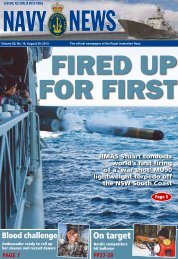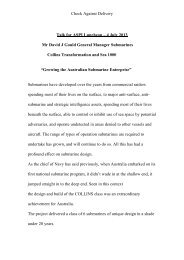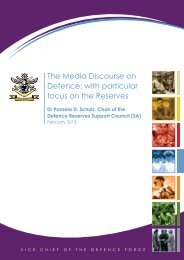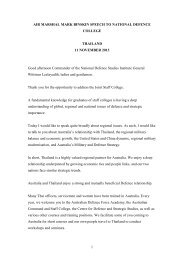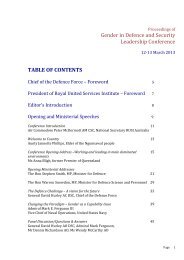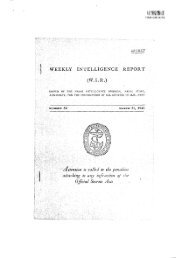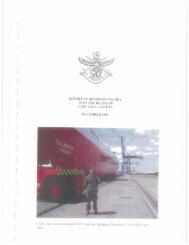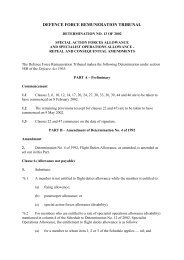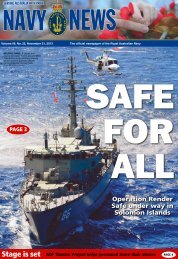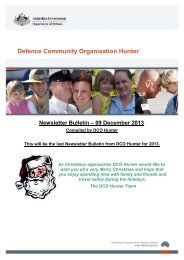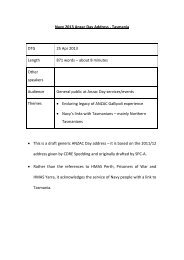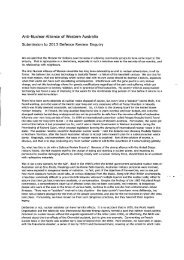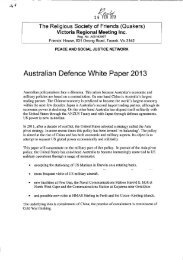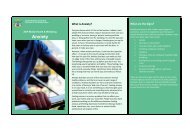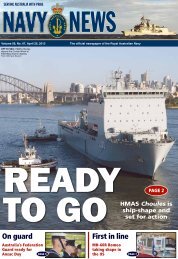Major General Jeffrey Rosenfeld AM - Department of Defence
Major General Jeffrey Rosenfeld AM - Department of Defence
Major General Jeffrey Rosenfeld AM - Department of Defence
You also want an ePaper? Increase the reach of your titles
YUMPU automatically turns print PDFs into web optimized ePapers that Google loves.
guest editorial<br />
<strong>Major</strong> <strong>General</strong> <strong>Jeffrey</strong> <strong>Rosenfeld</strong> <strong>AM</strong><br />
Surgeon <strong>General</strong> <strong>Defence</strong> Health Reserves<br />
<strong>Major</strong> <strong>General</strong> <strong>Jeffrey</strong> Victor <strong>Rosenfeld</strong> joined the<br />
Australian <strong>Defence</strong> Force in 1984 as a Direct Entry<br />
Officer. His postings have included Medical Officer<br />
to 6th Field Ambulance and 4th/19th Prince <strong>of</strong><br />
Wales Armoured Regiment, Senior Medical Officer<br />
4th Brigade and Officer Commanding 6th Mobile<br />
Field Surgical Troop (6MFST). He was SO1 Health<br />
Administration in RHSA Victoria 1998-2000. He<br />
attended Reserve Staff College and Army Logistic Training Centre, and<br />
has been Chair <strong>of</strong> the <strong>General</strong> Surgery Consultative Group, Consultant<br />
in Neurosurgery to the Surgeon <strong>General</strong> and Assistant Surgeon <strong>General</strong><br />
(Army). He was appointed Adjunct Pr<strong>of</strong>essor to the Centre for Military and<br />
Veterans’ Health (CMVH), University <strong>of</strong> Queensland, in 2006 and is Chair<br />
<strong>of</strong> the Editorial Board <strong>of</strong> ‘ADF Health’ the journal <strong>of</strong> the <strong>Defence</strong> Health<br />
Services. He is a Board Member <strong>of</strong> the Sir Edward Weary Dunlop Medical<br />
Research Foundation and a member <strong>of</strong> the Medical Research Advisory<br />
Committee <strong>of</strong> the <strong>Defence</strong> Health Foundation.<br />
<strong>Major</strong> <strong>General</strong> <strong>Rosenfeld</strong> was awarded the Ge<strong>of</strong>frey Harkness Medal in<br />
2001 for outstanding service to Royal Australian Army Medical Corps<br />
(RA<strong>AM</strong>C) and the Centenary Medal <strong>of</strong> Federation. He received the <strong>AM</strong><br />
in the <strong>General</strong> List <strong>of</strong> the 2011 Queen’s Birthday Honours. He is the<br />
recipient <strong>of</strong> the Michael E DeBakey International Military Surgeons’ Award<br />
for Excellence for 2009 and was awarded a US Air Force Commendation<br />
Medal for his service in Iraq. He is one <strong>of</strong> Australia’s senior military<br />
surgeons and has served on seven operations including Rwanda, Solomon<br />
Islands, East Timor, Bougainville and Iraq. He has a particular expertise in<br />
the treatment <strong>of</strong> bomb blast injury.<br />
In his civilian work, <strong>Major</strong> <strong>General</strong> <strong>Rosenfeld</strong> is the Pr<strong>of</strong>essor and Head<br />
<strong>of</strong> the <strong>Department</strong> <strong>of</strong> Surgery, Monash University and the Director <strong>of</strong><br />
Neurosurgery, Alfred Hospital and is a leader in Australian neurosurgery<br />
with an international pr<strong>of</strong>ile. He is an international leader in surgery for<br />
hypothalamic hamartoma which causes severe epilepsy in children. His<br />
particular research interest is in neurotrauma, a Principal Investigator on the<br />
Bionic Vision Project at Monash University and is leading the development<br />
<strong>of</strong> a new Institute at Monash University for Brain Development and Repair.<br />
He is Honorary Pr<strong>of</strong>essor <strong>of</strong> Neurosurgery to the University <strong>of</strong> Papua<br />
New Guinea and Visiting Pr<strong>of</strong>essor to the Neurosurgical <strong>Department</strong><br />
<strong>of</strong> the Beijing Tiantan Hospital, Capital University <strong>of</strong> Medical Sciences,<br />
Beijing, China. Pr<strong>of</strong>essor <strong>Rosenfeld</strong> has published over 220 peer reviewed<br />
articles, book chapters and a book. He is also a member <strong>of</strong> five editorial<br />
boards <strong>of</strong> international medical journals and is a member <strong>of</strong> the Ethics<br />
Committee and the Neurotrauma Committee <strong>of</strong> the World Federation <strong>of</strong><br />
Neurosurgical Societies. He is a Paul Harris Fellow <strong>of</strong> Rotary International,<br />
was President <strong>of</strong> the United Nations Association <strong>of</strong> Australia (UNAA)<br />
Victoria and Commissioner <strong>of</strong> St John Ambulance Australia (Victoria) from<br />
December 2001 to June 2005.<br />
Reflections<br />
I am coming to the end <strong>of</strong> my appointment as Surgeon<br />
<strong>General</strong> Australian <strong>Defence</strong> Force-Reserves (SGADF-R) and<br />
wish to particularly thank all the Health Reservists for their<br />
service to the ADF. We continue to pass through a period <strong>of</strong><br />
unprecedented and momentous change in the ADF with many<br />
challenges still ahead. MAJGEN Paul Alexander AO, SGADF<br />
and Commander, Joint Health (CJHLTH) has strongly led<br />
Joint Health Command through this period <strong>of</strong> change which<br />
has been made doubly challenging by the extensive savings<br />
mandated by the Strategic Reform Program (SRP). A key<br />
initiative was the move <strong>of</strong> <strong>Defence</strong> Health to VCDF Group<br />
and the formation <strong>of</strong> Joint Health Command. Health logistics<br />
has become more efficient, and Garrison Health Support has<br />
been extensively reorganized and streamlined. The E-Health<br />
system is soon to be implemented. Many other changes have<br />
been successfully implemented or are in train.<br />
A major element <strong>of</strong> Health Service provision on ADF Operations<br />
comes from the Health Reserves and this will continue. The<br />
responsibility <strong>of</strong> the SGADF-R is to lead the Health Reserves,<br />
to ensure that they are well supported, and to represent their<br />
interests within JHC and to the senior leadership <strong>of</strong> the ADF.<br />
SGADF-R helps to ensure health capability to the ADF by<br />
promoting recruitment and retention <strong>of</strong> Health Reservists<br />
particularly medical specialists. This has proved challenging<br />
at a time when the ADF is replete with personnel, with a low<br />
attrition rate but with shortages <strong>of</strong> medical <strong>of</strong>ficers and other<br />
health personnel. As SGADF-R, I have continued to assist<br />
CJHLTH in forging strong links between JHC and the civilian<br />
health sector, the University sector and with the Pr<strong>of</strong>essional<br />
Colleges. We are further developing strategic alliances at<br />
<strong>Major</strong> Teaching Hospitals/Trauma Centres in each region. I<br />
have also been active in promoting the tremendous work <strong>of</strong><br />
our Health Reservists to the wider community both here and<br />
abroad.<br />
Military frontline trauma surgery is quite different from and<br />
more challenging than civilian trauma surgery because <strong>of</strong> the<br />
greater magnitude and scope <strong>of</strong> the injuries sustained from<br />
bomb blast, the unique structure <strong>of</strong> the military trauma system<br />
and the austere environment <strong>of</strong> the forward surgical units and<br />
combat support hospitals. Although we have the excellent<br />
Definitive Surgery Trauma Course (DSTC) and a one day<br />
ADF Health | Vol 12 N o. 1 | 2011 7
Military Module, these are arguably no longer sufficient to<br />
prepare our surgeons for war surgery. Currently, we are unable<br />
to replicate the more extensive US or British War Surgery<br />
courses. We should explore ways <strong>of</strong> further expanding our<br />
courses or securing places for our general surgeons on to the<br />
US or UK courses. A rapidly evolving evidence-based military<br />
surgical, anaesthetic and intensive care practice has emanated<br />
from the vast experience <strong>of</strong> our surgeons and our allies in<br />
Iraq and Afghanistan. We need to ensure our specialists are<br />
abreast <strong>of</strong> this information and that they can be seamlessly and<br />
confidently embedded into allied field hospitals.<br />
Even if we are not deploying our military hospital to an<br />
operation, we could embed small numbers <strong>of</strong> our personnel<br />
and individual specialists to supplement allied surgical hospitals.<br />
This has worked very well in Iraq and enables our troops to be<br />
treated by Australians and at the same time helps to deploy our<br />
superb health personnel who are highly regarded by our allies<br />
and who are keen to contribute. We also need to maintain the<br />
experience <strong>of</strong> our people in war trauma surgery and medical<br />
care but we also need to be prepared for Humanitarian Aid<br />
and Disaster Relief missions.<br />
A team <strong>of</strong> Reserve specialists able to deploy at short notice is<br />
soon to be established at the Royal Brisbane Hospital (RBH).<br />
By being embedded at the RBH, the military surgical team will<br />
remain current with trauma surgery and working as a team will<br />
be an advantage when they deploy. It should be emphasized that<br />
the ADF will still require its Specialist Reservists who are not part<br />
<strong>of</strong> these special teams to continue to staff the ongoing rotations<br />
<strong>of</strong> the future missions. Pr<strong>of</strong>essor Michael Reade, the inaugural<br />
Pr<strong>of</strong>essor <strong>of</strong> Military Medicine and Surgery and an active<br />
Reservist has been appointed at the University <strong>of</strong> Queensland.<br />
I wish him every success. His appointment augers well for<br />
the development <strong>of</strong> a research program in military trauma<br />
and all the national and international links and academic<br />
collaborations this will foster. The civilian disaster teams set<br />
up by each State and Territory might seem to be competing<br />
with the Reserves for members. I regard these teams as being<br />
complementary to the Reserves. Clearly, some Humanitarian<br />
Assistance missions will not require uniformed personnel. Some<br />
<strong>of</strong> our reservists will join these civilian teams and will be valued<br />
members because <strong>of</strong> their military experience.<br />
The Consultative Groups continue to provide Specialist advice<br />
to Joint Health Command on many issues <strong>of</strong> interest to<br />
<strong>Defence</strong>. They are made up mainly <strong>of</strong> Reservists and reflect<br />
contemporary practice in the civilian and academic health<br />
sector. We need to ensure that they are well supported to do this<br />
important work. The Reserves will continue to have a regional<br />
focus and require regional support. The regional Triumvirates<br />
with leadership from the three services strongly support the<br />
Health Reserves in each region. The Triumvirates and their<br />
staff will increasingly integrate within the new regional <strong>Defence</strong><br />
Health Structures. Although the single services manage their<br />
own health personnel there will be more tri-service integration<br />
<strong>of</strong> personnel for Garrison health support and on operations<br />
in the future.<br />
Reservists will continue to be involved in the delivery <strong>of</strong> Mental<br />
Health Services and Rehabilitation in the ADF. Reserve dentists,<br />
nurses and nurse practitioners, radiographers, physiotherapists,<br />
pharmacists, preventive medicine personnel and pathology<br />
technicians continue to make a major contribution to our<br />
overall capability and I thank them all for their service. In the<br />
future there will likely be a role for civilian paramedics to serve<br />
as Army medics.<br />
I am very proud <strong>of</strong> the Health Reservists who selflessly and<br />
repeatedly give <strong>of</strong> their time and expertise when called upon.<br />
I am particularly proud <strong>of</strong> the Reservists who help to train our<br />
deploying frontline troops in Tactical Combat Casualty Care in<br />
our Mission Rehearsal Exercises. I am sure this preparation <strong>of</strong><br />
our Soldiers and Combat Medics is saving lives and achieving<br />
better outcomes for our injured personnel. I am also very<br />
proud <strong>of</strong> our specialists and other health pr<strong>of</strong>essionals from<br />
the Reserves who care so diligently for our injured warriors<br />
in Afghanistan and following their return to Australia and for<br />
the support the Reserves provide to the other ADF Operations.<br />
Thank you for the superb service you all do for your single<br />
Services, the ADF and Australia.<br />
It has been an enormous privilege and honour to serve the<br />
ADF as the SGADF-R. I acknowledge the great work <strong>of</strong> my<br />
immediate predecessors, MAJGEN J Pearn AO, AVM B Short<br />
<strong>AM</strong>, and RADM G Shirtley <strong>AM</strong>, RANR. I wish my successor<br />
AVM Hugh Bartholomeusz O<strong>AM</strong> and the incoming CJHLTH,<br />
RADM Robyn Walker <strong>AM</strong> and her staff every success for<br />
their appointments and wish Joint Health Command and all<br />
<strong>Defence</strong> Health personnel well for the future. There is a strong<br />
history and foundation from which to build.<br />
HMAS STIRLING<br />
Dental Officer, Commander Mark Brazier, conducts a routine<br />
check up on a patient with Able Seaman Dental Assistant<br />
Katrina Martin in the Fleet Base West Dental <strong>Department</strong> at<br />
HMAS Stirling.<br />
8 ADF Health | Vol 12 N o. 1 | 2011



